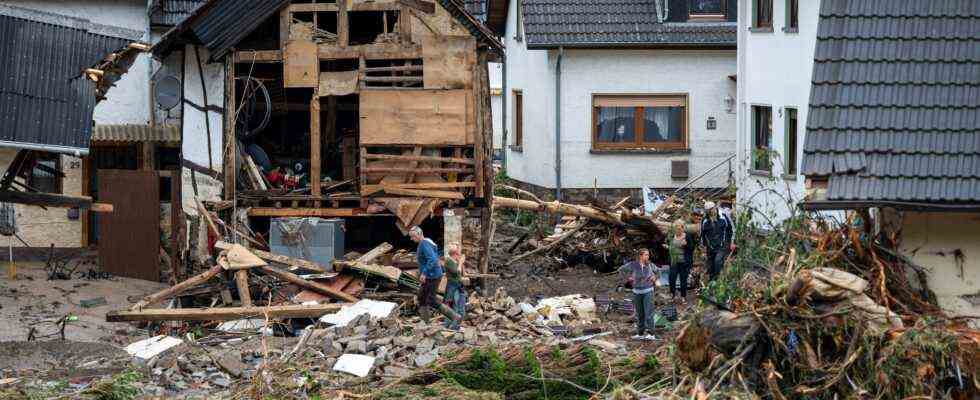Status: 07/17/2021 9:38 a.m.
After the severe storms, demands for rapid aid from the federal and state governments are increasing. Rhineland-Palatinate has already made financial resources available. The federal government wants to advise next week.
The demands for rapid aid from the federal and state governments for the areas hit by the storm are growing louder. In view of the extensive destruction of the infrastructure in the floodplains in North Rhine-Westphalia and Rhineland-Palatinate, a “national effort by the federal government and the affected federal states” is necessary, said the chief executive of the association of cities and municipalities, Gerd Landsberg, the “RedaktionsNetzwerk Deutschland” (RND ).
The reconstruction must be “quickly and unbureaucratically organized and financed” by the federal and state governments. First aid would have to be provided at short notice, but also financial commitments for necessary construction work, demanded Landsberg.
Laschet announces multi-stage aid program
Rhineland-Palatinate has already provided 50 million euros as short-term support to repair damage to roads, bridges and other structures.
NRW Prime Minister Armin Laschet announced a multi-stage aid program for the victims of the storm disaster in his state. The funds available up to now for emergency aid in the event of heavy rain events would “by far not be sufficient”.
Schulze expects quick help from the federal government
Federal Environment Minister Svenja Schulze expects that those affected by the flood will receive quick financial help from the federal government. But she could not say a date from when the support would be available, said Schulze in the WDR. Federal Finance Minister Olaf Scholz is in coordination with the federal states. “We will find a solution.” It must also be looked at what more can be done for prevention. There has also been a lot of criticism of flood protection measures in the past. “Now you can see how important such investments are.”
The federal cabinet wants to advise on help for those affected on Wednesday, as a spokesman for the Federal Ministry of Finance announced. Head of department Scholz is holding talks within the federal government in order to provide quick help.
Federal Minister of the Interior Horst Seehofer also emphasized to the “Spiegel” that on Wednesday help in the cabinet should be discussed. He does not want to give details before there is a clear picture of the extent of the damage. “But you can assume that it will be a big package,” said Seehofer.
Buschmann calls for an increase in the development aid fund
The parliamentary managing director of the FDP parliamentary group, Marco Buschmann, appealed to the federal government in the RND to decide on “unbureaucratic emergency aid” as soon as possible. The people affected in North Rhine-Westphalia and Rhineland-Palatinate must be helped “as quickly as possible”.
Buschmann referred to the development aid fund that the federal government had launched in 2013 after the flood disaster at the time: “This should be topped up and used.” A special session of the Bundestag must be convened immediately for this.
In 2013, the federal and state governments jointly provided eight billion euros to repair flood damage and to compensate private households and companies. Up to 80 percent of the damage could be reimbursed for the injured party.
“Fast help counterproductive in the long term”
On the other hand, Daniel Osberghaus from the Leibniz Center for European Economic Research (ZEW) is skeptical about the demand for quick help for those damaged by storms. “Economic research shows that quick and unbureaucratic help for flood victims, no matter how necessary it may appear in individual cases, is counterproductive in the long term,” he said. They ran counter to the incentives for private provision, such as taking out insurance against natural hazards or structural precautionary measures.
In addition, they de facto disadvantage homeowners with insurance and could quickly be perceived as unfair, the scientist said. The discussion about aid funds distracts from the actual task of politics: In view of the advancing climate change, it is important to develop long-term measures for extreme weather situations that work without state flood aid. This included promoting personal provision, especially for low-income households in risk areas, strengthening the insurance market for natural hazards, for example through compulsory insurance, and less surface sealing.
In the short term, however, according to Osberghaus, these measures will not help to repair the damage in western Germany. A possible intermediate step would therefore be to only pay the currently promised state aid if it is necessary to secure the company’s existence; they would also have to be linked to requirements for private provision. “However, this will not be possible quickly and unbureaucratically,” added Osberghaus.
Federal government prepares aid package for flood disaster
Isabel Reifenrath, ARD Berlin, July 16, 2021 9:44 am

